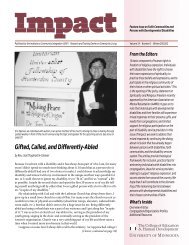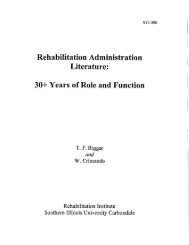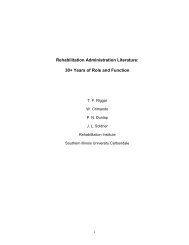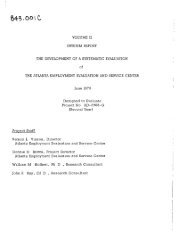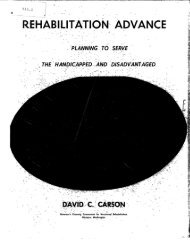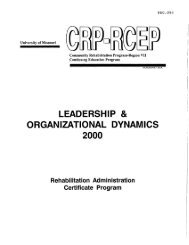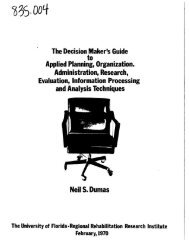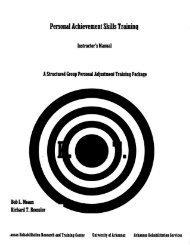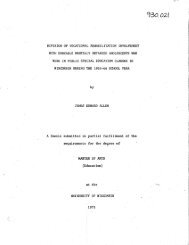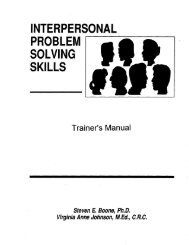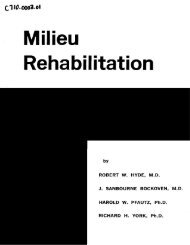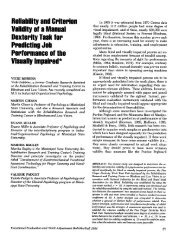Meeting Global Deaf Peers, Visiting Ideal Deaf Places ... - NCRTM
Meeting Global Deaf Peers, Visiting Ideal Deaf Places ... - NCRTM
Meeting Global Deaf Peers, Visiting Ideal Deaf Places ... - NCRTM
Create successful ePaper yourself
Turn your PDF publications into a flip-book with our unique Google optimized e-Paper software.
DEAF WAYS OF EDUCATION LEADING TO EMPOWERMENT<br />
looked like a “dream world” in their<br />
eyes. If they had stayed longer, they<br />
would have noticed that the dream<br />
worlds are not perfect and have their<br />
own struggles; yet these “imperfect”<br />
barrier-free environments are still empowering<br />
for those starting from the<br />
Belgian deaf experience.<br />
Filip also stressed this experience<br />
when talking about his visit to Gallaudet<br />
University (translated interview,<br />
2005): “Then there was the study trip<br />
to Gallaudet: See, see!” Seeing this<br />
barrier-free environment, and comparing<br />
it with the lived experience of barriers<br />
in Flanders, was empowering.<br />
<strong>Deaf</strong> people “learn the full meaning of<br />
access and apply that awareness to<br />
their future lives in the wider society”<br />
(Jankowski, 1995, p. 1, as cited in<br />
Jankowski, 1997, p. 158). Although<br />
empowerment through rhetoric has<br />
been studied for deaf people and people<br />
with disabilities (Charlton, 1998;<br />
Jankowski, 1997), this theme of deaf<br />
empowerment through the connection<br />
of the coming into contact with<br />
deaf cultural rhetoric and comparison<br />
of deaf dream worlds with barrier environments,<br />
as it appears in the life<br />
stories of Flemish deaf leaders, has not<br />
been examined yet. In the present article,<br />
I argue for further research on this<br />
topic.<br />
“The Insurrection of [<strong>Deaf</strong>]<br />
Subjugated Knowledge”<br />
The new empowering rhetoric that<br />
Flemish deaf people carry with them<br />
can be connected to their previous<br />
resistance against standard views<br />
and oppression and their subjugated<br />
knowledge of the deaf way of life. This<br />
is illustrated by the educational experiences<br />
of deaf people in deaf schools.<br />
Crucial for deaf people in connecting<br />
in global encounters is the discussion<br />
in their own language, sign language,<br />
and a shared experience of being deaf<br />
in a world that is hearing (Murray, in<br />
12<br />
press). Vincent Ameloot (translated<br />
interview, 2004), a Flemish deaf leader,<br />
described his experiences when visiting<br />
Denmark in 1992:<br />
Before, I had a lot of international<br />
contacts. International sign language?<br />
No problem. I was very strong in<br />
sports, but deaf aware? Nothing. Inside,<br />
I had a lot of questions. I asked<br />
and asked, but I didn’t get answers,<br />
nothing. I thought, “It will always be<br />
the same: <strong>Deaf</strong>, that will always be a<br />
problem, that will always be.”<br />
Then I went to Denmark, and<br />
there was a lecture by Asger Bergmann.<br />
I thought about myself, how I<br />
was as a person, and I connected<br />
that with Asger Bergmann. My eyes<br />
opened. He talked for 4 or 5 hours,<br />
about many different topics. I watched<br />
and I was surprised: <strong>Deaf</strong> people can<br />
do that, that, that! And a lot more<br />
information, deep, deep, deep. I<br />
thought: “My brother, my sisters, can<br />
go to university, and so can he: That<br />
is possible there through an interpreter!”<br />
Deep, deep, deep about<br />
deaf culture, education, sign language<br />
courses for kids and adults.<br />
And a lot more. I threw my problems<br />
away, and I took a new identity!<br />
Then there was another lecturer,<br />
Knut Sondergaard. He also lectured<br />
for 2, 3 hours. Oh, my mind went<br />
open, but then I was so tired that I<br />
could hardly keep my eyes open.<br />
Now I was tired. So that went on. But<br />
when it was done, they all said, “Oh,<br />
good, good!” But I was quiet, calm. I<br />
went to bed. I got up, and suddenly I<br />
was strong. A bomb had exploded!<br />
That, that. . . .<br />
I would like to change those<br />
things when I am back in Belgium!<br />
Things have to be the same as in<br />
Denmark: strong! More and more,<br />
my deaf awareness grew. I was already<br />
25 when I started to become<br />
more aware. I had gone abroad, and I<br />
felt, “We have to do that and that and<br />
that!” But the other deaf had stayed<br />
in Belgium, oh, oh. “You all have to<br />
go!” [Talking to me, Goedele de<br />
Clerck:] Just like you have been to<br />
Gallaudet. Then they would grow<br />
too! They noticed that was strong. I<br />
had exploded; they, not yet.<br />
The term empowerment has been<br />
interpreted in many ways and has become<br />
popular (at least in the United<br />
States), yet it is not always clear how<br />
the term is used (Chamberlin, 1997).<br />
Most writers stress the “process of<br />
helping people gaining control over<br />
their own lives” (Pease, 2002, p. 29).<br />
Adams (1995, p. 5, as cited in Pease,<br />
2002, p. 29) defines empowerment as<br />
“the means by which individuals,<br />
groups, and/or communities become<br />
able to take control of their circumstances<br />
and achieve their goals.” <strong>Deaf</strong><br />
people become more empowered<br />
when they have more opportunities<br />
to make choices (Fosshaug, 2004).<br />
Jankowski (1997) stresses the agency<br />
of oppressed groups. She defines empowerment<br />
as “a process through<br />
which a marginalized group alters the<br />
distribution of power between itself<br />
and the dominant culture” (p. 6).<br />
Chamberlin (1997), in her research<br />
toward “a working definition for empowerment”<br />
(p. 43), found that empowerment<br />
has both an individual<br />
and a group dimension: “Empowerment<br />
does not occur to the individual<br />
alone, but has to do with experiencing<br />
a sense of connectedness with other<br />
people” (p. 45; see also Van Hove &<br />
Roets, 2000).<br />
Key factors in empowerment are<br />
“access to information, ability to<br />
make choices, assertiveness, and selfesteem”<br />
(Chamberlin, 1997, p. 43).<br />
Fosshaug (2004) observes that “empowerment<br />
on the social level increases<br />
when deaf people have the<br />
possibility of political influence in the<br />
VOLUME 152, NO. 1, 2007 AMERICAN ANNALS OF THE DEAF



